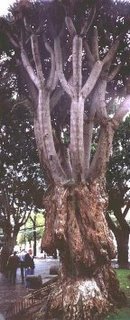והיא יושבת תחת-תמר דבורה, בין הרמה ובין בית-אל--בהר אפרים; ויעלו אליה בני ישראל, למשפט
And she sat under the palm-tree of Deborah between Ramah and Beth-el in the hill-country of Ephraim; and the children of Israel came up to her for judgment.
Shoftim 4:5
The name of neviah (prophetess) Devorah (דבורה), who sat under (in the place of) a palm tree [1], comes from the shoresh (3-letter Hebrew root) DBR (דבר) meaning: collecting, gathering, combining separate items into one, connecting words with coherent speech, word, something, on account of or because of, commandment, judicial regulation, temple interior, raft of lashed planks, bees, and plague or epidemic [2]. This shoresh is associated with the sefirah Gevurah [3]. The dragon is the mythic animal corresponding to the sefirah Gevurah [4].
The name Devorah is comprised of 5 Hebrew letters. These 5 letters represent the 5 unrectified feminine judgments (dinim) in Malchut, where Malchut is represented by the second hei (ה) of the tetragrammaton. This hei corresponds to the power of expression (אמר). Consequently, Dragon's Blood is a botanical representing "slaying the dragon". In other words, it represents the rectified feminine power of expression.
 Dragon's Blood is a resinous substance harvested from a Sumatran tree from the palm family. The mature fruit of the Dragon's Blood palm is reddish resin covered berries the size of cherries which end in points.
Dragon's Blood is a resinous substance harvested from a Sumatran tree from the palm family. The mature fruit of the Dragon's Blood palm is reddish resin covered berries the size of cherries which end in points.  see here
see hereThe Dragon Tree of the Canary Islands (shown below) is (like the baobob tree) the "oldest living representative of the vegetable kingdom" (see link).
 Footnotes:
Footnotes:[1] The word in the pasuk for "beneath" a palm tree is תחת , which can also be translated (see [2]) as "in place of" or "instead of". As a judge, the implication here is that Devorah sat making judgments. In other words, she could adjudicate the terms of justice, determining the sentence according (in the place of) the crime or violation.
[2] Etymological Dictionary Of Biblical Hebrew, R' Matityahu Clark (p. 46)
[3] Sha'are Orah, R' Yosef Gikatilla (pp. 48-49)
[4] Grimoire For The Apprentice Wizard, Oberon Zell-Ravenheart (p. 138)

No comments:
Post a Comment